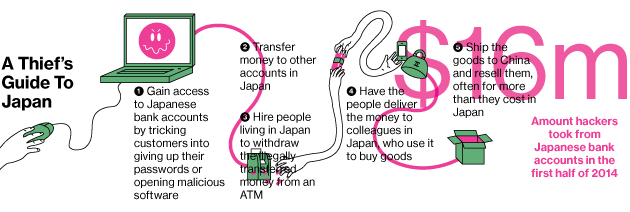
Hackers are plundering Japanese bank accounts in huge sums and police say Chinese gangs are progressively to blame. Crooks stole ¥1.8 billion (or sixteen million US dollars) from records at banks including the Mitsubishi UFJ Financial Group and the Sumitomo Mitsui Financial Group in the first half of the year, surpassing the full-year record of ¥1.4 billion in 2013, as indicated by Japan’s National Police Agency. Of the 133 captures associated with the robberies of that time, Chinese nationals made up the biggest group with eighty three (or sixty two percent), about two-fold the captures of Japanese. Japan sees a profound Chinese association in these cyber theft cases. “They want to take away the wealth of Japanese people and import it into China,” a comment made by Arichika Eguchi, the police department’s Chief of Cyber Crime Examinations.
The trick they used is made up of various steps: Chinese gangs hack into Japanese financials by deceiving clients into opening malicious programs or by revealing their passwords. They take the cash by exchanging it to different accounts in Japan, then contracted individuals who live in the nation withdraw the money at ATMs. Those individuals distribute the cash to associates in Japan who use it to purchase merchandise that is then delivered to China. There the items are sold, with the returns heading off to the godfather(s).
Japan’s largest banks — Mitsubishi UFJ, Sumitomo Mitsui, and Mizuho Financial Group — are cautioning their clients about the increment in online burglary and refunding victimized people on a case-by-case basis. The nation is a simple target in light of its riches and proximity to China and the absence of experience in managing PC hacking. “Japanese individuals and organizations are not exceptionally refined in terms of PC security,” says Hiroshi Koide, an associate professor of artificial intelligence at the Kyushu Institute of Technology, who exhorts the Fukuoka Prefectural Police on cyber crime countermeasures. Japan’s gigantic resources guarantee huge profits.
Japan has had a large number of individuals captured who were the workforce that would withdraw money for their ‘supervisors’. Most of these people are either exchange students or people specially trained for such things and who acknowledge this job without knowing that they are committing a crime. “They think it is a simple part time job,” says Eguchi.
 Image Source: Techworm – An image explaining the gang(s) operations
Image Source: Techworm – An image explaining the gang(s) operations
Dai Wan, a 22-year-old Chinese lady going to school in Japan, was captured in the wake of withdrawing very nearly ¥12 million stolen from Japanese internet savings records, as per police in Kyoto. Following up on guidelines received through the Chinese-dialect QQ instant message service, Dai purportedly took the cash out of ATMs at accommodation stores in the city over two months, beginning in March.
She has been accused for sending money to other Chinese people living in Japan to purchase extravagant merchandise and diapers, which are likely to be dispatched to China to be sold at higher costs. The cash they take in Japan will wind up providing for them big returns in China. Dai was accused of robbery and the exchange of criminal goods and is being held in confinement pending a trial in the District Court. Dai’s attorney, Hiromasa Nakaya, says his client did not know that she was perpetrating a crime or working for gangs. She thought she was doing a ‘regular’ part-time job.
Clients going to the Bank of Tokyo-Mitsubishi UFJ or to the ATMs of Mitsubishi UFJ saw a red and yellow caution sign with verbiage urging them not to enter their passwords, this was due to messages that appeared to originate from the bank but did not. The site also alerts clients to PC infections and offers defensive programs against malware. “This is a game of cat and mouse. They always come up with tricks that seem to be one step ahead of our defenses,” states Japanese Bankers Association Chairman, Nobuyuki Hirano, who is also the president of Mitsubishi UFJ.
Anonymous recommends: Protect your PC & mobile devices from hackers & governments & surf anonymously
SOURCES:




